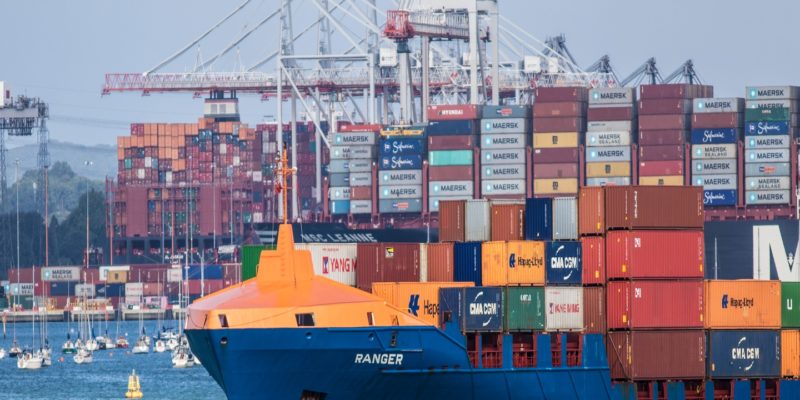State of play: what’s going to happen with UK freight after Brexit?
The Prime Minister of the UK, Boris Johnson, has pledged to deliver Brexit on 31 October 2019, without further delays, whether or not a deal is in place. Retailers and manufacturers are preparing their supply chains, with companies and organisations reviewing their distribution networks and, in many cases, stockpiling inputs. On 18 August, a UK government report on the detailed preparations and scenario modelling undertaken by HM Treasury was leaked to The Sunday Times. In this article, we review some likely sources of friction and delay and quantify the potential impact on supply chains.
Where are we now?
In August 2017, Oxera published an analysis on the implications of Brexit for UK ports. We focused on four illustrative scenarios reflecting the uncertainty surrounding what the outcome for UK–EU relations might be.
In September 2018, we published a further article on what a ‘no deal’ scenario could look like, presenting in some detail the potential impact on businesses and consumers. Since then, contingency planning for supply chains has increased significantly. The government is scaling up its preparations for a no deal situation, with the Prime Minister pledging an additional £2.1bn—bringing the amount spent on preparations to £6.3bn.
Where are the frictions likely to be?
Ahead of the March 2019 deadline, the government signalled that the majority of imports would be subject to zero tariffs for a temporary period to alleviate pressure on supply chains and consumer spending.1 Any further movements on regulations and tariffs would be subject to the ongoing negotiations between the UK and EU member states.
Along the physical supply chains, there are two dimensions of friction—enforcement and regulation. As we presented in our 2017 analysis, the level of enforcement (i.e. the number of consignments inspected) may increase due to any divergence in the regulatory standards of the two trading countries. To the extent that these inspections take place at a port, or at a border, these divergences could result in significantly longer checks and subsequent queues.
The increase in regulation could be driven by different or additional regulations. In particular, the scope for errors or delays includes businesses not filing their paperwork correctly, officials not being trained quickly enough to check the new paperwork, and problems complying with new regulations.
Crucially, these frictions could occur on either side of the border, and therefore coordinated responses are required to minimise any overall impact on businesses.
A simple model of the frictions
Using a conservative series of assumptions, we estimate that the additional cost of haulage to businesses due to these frictions would be at least £3.7bn per year. Using a queuing model that is based on an arrival and departure rate, we assume that the projected rate of enforcement will be 85%—that is, 85% of vehicles are stopped and inspected during the first three months, after which the rate falls to 10%. This could be on either side of the border (i.e. the UK side or the EU side) and could be a result of random checks, or as a result of businesses not necessarily having prepared the correct paperwork. The leaked Operation Yellowhammer documents suggest that up to 85% of lorries travelling through the main crossings may not be ready for French customs, and estimates that the significant disruption may last for up to three months before the traffic flows improve.2 Certain items, such as food or plant-based products arriving at EU ports from the UK, may also be subject to physical checks.
We also assume that the duration of checks will increase fourfold. This could be due to additional or different checks being applied, more thorough application of the same checks, or the use of newer officials who are less experienced and therefore take longer to carry out their duties. We allow for an increase in the number of customs officials at the border, which allows a quicker processing time for vehicles—however, given restrictions on space, equipment and lags for training, this ultimately does not increase the departure rate of trucks.
The additional queue time generated by the queuing model is then converted into a price for additional haulage services, using information from the Road Haulage Association on costs. This scenario suggests that it would take 1.6 days for a lorry to pass through a port for the first three months after a no deal exit, after which it would take 1.1 days. This aligns with the lower end of the range of disruption estimated in the Operation Yellowhammer documents, suggesting that our scenario is conservative.3 Wait times of this magnitude would result in severe queues and disruption in the areas surrounding ports at both ends of the border, with all lorry parks filling up rapidly.
This is larger than the impact we estimated in our 2017 analysis, reflecting further refinements to the model and updated information on the preparedness of the UK and its EU trading partners. We consider this to be a conservative estimate. It does not account for:
- the economic costs of the uncertainty involved (the model assumes a fairly low number of checks, and an additional short number of checks);
- the costs of the extra staff needed (for hauliers, ports and customs officials);
- any operational uncertainty around the new procedures;
- costs associated with stockpiling;
- any inventory costs for businesses;
- the wider economic impacts of uncertainty over the operation of just-in-time logistics.
The estimate presented above does not account for any preparations that businesses have already made, nor those that businesses will be making to mitigate any risk to their supply chains. The full cost is likely to be much higher.
What preparations are being made?
Additional spending committed by the UK government includes £344m for readying new border and customs operations, which includes an additional 500 Border Force officers, improvements to passport processing, improved infrastructure at ports, and more support for ‘Operation Brock’, the traffic management system created to tackle queues arising from any delays from Dover and Eurotunnel.
An additional £434m is being allocated to assist freight capacity, warehousing and stockpiling, including supplies of medicines. A budget of £8m has been set aside by HMRC for training importing and exporting companies, haulage companies, and freight forwarders. However, government officials have apparently expressed concerns around the level of uptake of the fund, which could signal that companies are underprepared.4
Examples of industry preparation for Brexit include the recent request from the Food and Drink Federation (FDF) to the government to relax competition law for the food and drink industry for a period of time. At present, competition law prohibits suppliers and retailers from discussing their supply and prices. In the face of disrupted supplies following a no deal Brexit, the FDF wants the food industry to be able to direct and prioritise shipments, which requires coordination among players in the industry—which could involve discussions that would usually fall foul of competition law.5
Ahead of the March 2019 Brexit deadline, retailers and manufacturers had already signalled concerns around interruptions in supply chains, and many have been stockpiling key supplies. Notably, the NHS has been stockpiling key medicines for several months.6 This is a trend that appears to be continuing, suggesting increased company preparedness, in the face of uncertainty about outcomes at the border.7
A retailer told the BBC that 30 ‘massive’ warehouses would be needed to store enough food to supply the UK for one week,8 and the UK Warehousing Association has noted a significant spike in the demand for warehousing space in recent months.9 However, HIS Markit suggests that the spike in stockpiling occurred only prior to the March 2019 deadline, and not since.10 This indicates that stockpiling is taking place in anticipation of short-term interruptions only—and the expectations are that problems at the border are likely to be significantly more troublesome in the short term while importers, exporters, haulage companies, customs officials and other key players adjust to the new systems in play. Even consumers are stockpiling food, drinks and medicine—The Guardian reported on a Premium Credit survey that showed consumers have spent £4bn stockpiling these items.11
The Irish government has plans to expand its port infrastructure in Dublin Port and Rosslare Europort, including improving staffing, IT, infrastructure and operational requirements. Additional inspection bays for roll-on roll-off traffic, as well as lorry parking and a new traffic management system, are planned, along with dedicated staff for live animal inspections.12
Meanwhile, the French government is spending €50m on expanding port and airport infrastructure to accommodate additional customs officials and inspections.13 The Netherlands, Belgium and Spain have additional customs officials and border guards ready to deploy to the ports.14
The European Commission plans to introduce a new shipping route, connecting Irish ports (Dublin and Cork) directly to Zeebrugge, Antwerp, Rotterdam, Calais, Dunkirk and Le Havre, removing the UK from the transport corridor.15 This will serve to reduce the traffic flowing through the UK and could reduce some of the customs checks that will be required at UK ports, reducing the pressure.
The UK government has been scenario modelling the impact of potential disruptions. The leaked Operation Yellowhammer documents suggest a central case scenario of 50–85% of lorries being stopped. This is worse than the previous ‘reasonable worst case scenario’, which considered that 40–60% of freight would be stopped by the French government.16 Crucially, the UK government’s assessment of the most likely scenario is worsening over time, which likely reflects the uncertainty facing businesses, the lack of information available to businesses around any new procedures and a lack of awareness of the risks or ability to prepare and mitigate. This ‘central estimate’ is in spite of the tangible investments that are being undertaken by the other governments, along with further cooperation between cross-country border officials to facilitate the smooth passage of freight.
Are these preparations enough?
Our queuing analysis shows that even small disruptions—even a few minutes—or a small increase in the number of checks could have a significant impact on queue times at UK ports. Therefore, the impact on individual retailers or manufacturers could be very costly even after an equilibrium is reached, with some sectors more vulnerable to severe disruption than others (given the level of checks required). Indeed, sectors dealing in perishable goods and medicines might suffer disproportionately.
The latest worst-case scenarios leaked from the UK government suggest that the immediate impact could be extremely severe, with significant reductions to the flow at ports. The worst of the pressure could ease once businesses, supply chains and officials have adapted to any changes. Nevertheless, in the meantime, the cost to business—and, ultimately, consumers—could still be high.
1 Hollingbery, G., The Rt Hon. Mel Stride MP and HM Treasury, Department for International Trade (2019), ‘Temporary tariff regime for no deal Brexit published’, 13 March.
2 Urwin, R. and Wheeler, C. (2019) ‘No-deal Brexit: up to 85% of lorries travelling to France will not be ready for new customs rules’, The Sunday Times, 18 August.
3 Urwin, R. and Wheeler, C. (2019) ‘No-deal Brexit: up to 85% of lorries travelling to France will not be ready for new customs rules’, The Sunday Times, 18 August.
4 Chu, B. (2019), ‘Brexit: ‘Low take-up of no-deal fund concerning’, BBC News, 7 August.
5 Rycroft, T., FDF Chief Operating Office (2019), ‘FDF statement on competition laws in the event of a no-deal Brexit’, FDF News Article, 7 August.
6 NHS England, ‘Continuity of supply frequently asked questions’.
7 A high profile example is Domino’s Pizza Group, which has been stockpiling tomato sauce: Dominos (2019), ‘Interim Results for the 26 Weeks Ended 30 June 2019’, 6 August.
8 Islam, F. (2019), ‘Brexit: Food industry seeks no-deal competition waiver’, BBC News, 7 August.
9 UKWA, ‘Statement on food stockpiling by UKWA CEO’.
10 Williamson, C. (2019), ‘UK Manufacturing moves into decline as boost from Brexit stockpiling fades’, IHS Markit, 3 June.
11 The Guardian (2019), ‘Britons have spent £4bn stockpiling goods in case of no-deal Brexit’, 12 August.
12 Government of Ireland (2018), ‘Preparing for the withdrawal of the United Kingdom from the European Union on 29 March 2019’, December.
13 Henry, G. (2019), ‘France triggers €50M ‘hard Brexit’ contingency plan’, Politico, 17 January.
14 The Netherlands Ministry of Foreign Affairs (2019), ‘No deal Brexit: Impact and measures’, 29 March; national Brexit information in member states can be found here: https://ec.europa.eu/info/brexit/brexit-preparedness/national-brexit-information-member-states_en.
15 Douanes et Droits Indirects (2019), ‘Franchissons le Brexit ensemble!’ (in French), 1 March.
16 Islam, F. (2019), ‘Brexit: UK assumes French plans ‘will ease no-deal disruption’’, BBC News, 7 August.
Related

Ofgem RIIO-3 Draft Determinations
On 1 July 2025, Ofgem published its Draft Determinations (DDs) for the RIIO-3 price control for the GB electricity transmission (ET), gas distribution (GD) and gas transmission (GT) sectors for the period 2026 to 2031.1 The DDs set out the envisaged regulatory framework, including the baseline cost allowances,… Read More

Time to get real about hydrogen (and the regulatory tools to do so)
It’s ‘time for a reality check’ on the realistic prospects of progress towards the EU’s ambitious hydrogen goals, according to the European Court of Auditors’ (ECA) evaluation of the EU’s renewable hydrogen strategy.1 The same message is echoed in some recent assessments within member states, for example by… Read More

